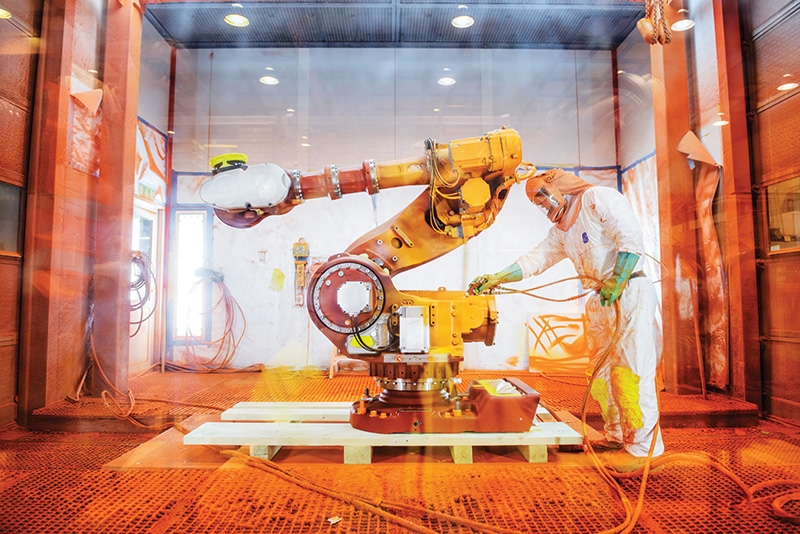EVFTA deepens trade partnerships
 |
| The EVFTA will help Vietnam access state-of-the-art technology from Sweden |
Over the last three decades, Vietnam has ventured to enact far-going economic reforms. The huge emphasis on attracting foreign direct investment has paid off, and the influx of capital is by all comparisons impressive.
 |
| Johan Alvin |
This, together with the fact that the country early on in its economic transformation embraced free trade as a vehicle for economic growth and prosperity, has developed Vietnam into an upcoming manufacturing hub in Southeast Asia.
The many free trade agreements (FTAs) have served to connect the Vietnamese economy to a number of economic areas, not least the ASEAN, South Korea, Russia and the 11 countries party to the Comprehensive and Progressive Agreement for Trans-Pacific Partnership.
The latest addition to the long list of FTAs, the EU-Vietnam Free Trade Agreement (EVFTA) along with the connected Investment Protection Agreement (IPA) will create an important vehicle, if adequately implemented, for Vietnam to add more value to goods and services produced in the country.
Vietnam’s large number of FTAs also carry a more strategic importance. By balancing its economic relations, Vietnam creates a more robust nation, avoiding becoming too dependent on one trading partner. The EU and Vietnam, two of the strongest proponents of free trade in the world, have thus deepened their relationship. The signing of the EVFTA and IPA sends a signal to the world in favour of free trade and its merits. In a time when free trade is more often questioned, this signal should not be underestimated.
Sweden and Vietnam are two relatively small coastal countries dependent on global trade and international integration. Sweden, just like Vietnam, realised that trade, openness to the rest of the world, and multilateral co-operation are keys to prosperity. Sweden counts on Vietnam as a strong partner against the danger posed to the global economy by protectionist tendencies.
Coming from a nation whose economic prowess by large is dependent upon – and was created by – free trade, I look with concern upon the recent trends questioning the positives of free trade. In Sweden, 1.3 million Swedes go to work every day working in trade-related jobs – this, in a nation of just 10 million inhabitants.
Half of our GDP stems from trade. Around 150 years ago, Sweden was one of the poorest nations in Europe. One fifth of its population emigrated to the United States in the late 1800s due to the dire outlook for prosperity. By embracing free trade, making high-class education available for everyone, and implementing transparency and democracy, our nation has today become one of the richest countries in the world.
Defending the notion that free trade is good does not mean saying it is without flaws. But by signing FTAs with proper clauses safeguarding sustainability, labour issues, and intellectual property, this can be mitigated. The EVFTA is such an example. It is not flawless, but it is a modern and progressive FTA.
CHANGES NEEDED
Beyond the political signal being sent by signing the agreement, there lies great economic potential in the EVFTA and the IPA for both sides. For Vietnam, the potential is huge, the EU being its second-largest export market. Once the agreement has been ratified by the European Parliament, the work to harvest that potential will commence.
Companies from member states of the EU and from Vietnam need to increase understanding of the benefits that lies in the agreement, and subsequently use the provisions for economic gain. The EU Commission and the Vietnamese government are already engaging in capacity development for Vietnamese authorities on how to enact the provisions in the agreements.
Free trade comes with a demand to be flexible to change as a nation. In Sweden, we have had to go through a number of difficult but ultimately necessary changes when previously competitive sectors have run out of steam. Previously we had a big wharf industry as well as textile industry. When conditions for selling these products changed, mainly due to high cost of labour in Sweden, these industries became unviable, and structural changes in our economy became inevitable in order for Sweden to maintain its competitiveness. Hundreds of thousands of job opportunities vanished and new ones had to be created in other sectors. Re-education and education in general were a large part in enabling laid-off workers to find new jobs in often more knowledge-intensive sectors.
Vietnam will be facing similar challenges in the times to come. Some sectors will become less successful and others will grow. Vietnamese companies will need to further their productivity and improve standards to meet the requirements in the FTA. Workers, engineers, and software developers among others will all need to enhance skills and productivity. Cumbersome indeed at first, but it will no doubt be well worth the undertaking as they will become more competitive and help to grow the domestic economy while establishing Vietnam as a middle-income nation.
Vietnamese manufacturers of garments, shoes, and smart clothing will gain more beneficial access to the European market as tariffs are dropped immediately upon ratification. The trade and sustainable development chapter in the EVFTA will spur improved conditions for labour, which, as we have seen in other cases, will lead to increased productivity and, in turn, increased economic gains.
We will likely see a build-up of a garment industry with higher industrial know-how and competence. What will be needed is for regulating authorities and the Vietnamese government to be foresighted and enable these developments by creating as favourable conditions as possible.
The Vietnamese agricultural sector meanwhile will partially face new competition from European actors. The competition will, with proper management over time, lead to increased mechanisation, consolidation of ownership, higher yields, and increased value-adding in the agricultural sector.
To consumers from both sides, the EVFTA and the IPA is good news. It will bring about a better selection of goods and services with overall lower prices, increasing access to qualitative medicines, over time eliminating high import tariffs on cars, and allowing for more companies to compete for government procurement.
For companies gaining tariff-free access to a market of over 500 million Europeans, the benefits are equally big. To reap them, however, they need to improve corporate governance, take better care of the environment, and improve labour conditions. Those companies that will be able to adopt quickly will be highly successful.
BOON FOR BUSINESS
A more transparent and predictable environment for doing business as well as lower administrative burdens will make it possible for small- and medium-sized enterprises (SMEs) to move into the Vietnamese market.
For instance, Sweden, which is one of the most innovative countries in the world, is home to a host of SMEs thriving on innovation. Many of these are keen to internationalise their operations, and several are interestingly eyeing the Vietnamese market. These Swedish innovators have the potential to partner up with growing domestic companies and jointly grow the Vietnamese economy.
The EVFTA and IPA will serve to lower the overall risk and lead to more Swedish and European SMEs, as well as multinationals, partnering with Vietnamese companies – increasing economic growth and creating jobs while improving Vietnamese-made products.
This is very much welcome as we see the need to develop the domestic economy in Vietnam, and in this lies vast potential. In the longer run, we will also see more and more Vietnamese companies mature and invest in the European Union.
A recent study by the Swedish National Board of Trade showed that the average FTA over a 10-year period leads to an increase in bilateral trade of approximately 100 per cent. With a history of bold reforms to enact a market-driven economy and a population of entrepreneurial people, Vietnam stands a good chance to be a leading economy in Southeast Asia if it continues with the same boldness and hard work.
Trade relations between Vietnam and the EU have a bright future indeed – to the benefit of both European and Vietnamese citizens.
What the stars mean:
★ Poor ★ ★ Promising ★★★ Good ★★★★ Very good ★★★★★ Exceptional
Themes: EVFTA & EVIPA
Related Contents
Latest News
More News
- SK Innovation-led consortium wins $2.3 billion LNG project in Nghe An (February 25, 2026 | 07:56)
- THACO opens $70 million manufacturing complex in Danang (February 25, 2026 | 07:54)
- Phu Quoc International Airport expansion approved to meet rising demand (February 24, 2026 | 10:00)
- Bac Giang International Logistics Centre faces land clearance barrier (February 24, 2026 | 08:00)
- Bright prospects abound in European investment (February 19, 2026 | 20:27)
- Internal strengths attest to commitment to progress (February 19, 2026 | 20:13)
- Vietnam, New Zealand seek level-up in ties (February 19, 2026 | 18:06)
- Untapped potential in relations with Indonesia (February 19, 2026 | 17:56)
- German strengths match Vietnamese aspirations (February 19, 2026 | 17:40)
- Kim Long Motor and AOJ Suzhou enter strategic partnership (February 16, 2026 | 13:27)

 Tag:
Tag:




















 Mobile Version
Mobile Version